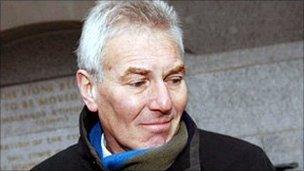MPs' expenses: David Chaytor starts prison sentence
- Published

Chaytor changed his plea to guilty shortly before his trial was due to start
Ex-Labour MP David Chaytor has spent his first night in Wandsworth prison after being jailed for 18 months for fiddling his parliamentary expenses.
He was sentenced on Friday after pleading guilty to fraudulently claiming more than £20,000 in expenses.
The former MP for Bury North admitted three charges of false accounting.
A court in London was told he submitted bogus invoices for IT consultancy work and claimed rent he never paid on homes owned by his family.
His lawyer James Sturman QC said he was a "broken man" who had paid a "devastating price" for the claims.
Chaytor now faces a large legal bill for both his defence and the costs of bringing the prosecution against him.
He made the false expenses claims in order to "siphon off" public money to which he was not entitled, Southwark Crown Court heard.
Sentencing him, Mr Justice Saunders said the 2009 MPs' expenses scandal had "shaken public confidence in the legislature and angered the public".
He said: "These false claims were made in breach of the high degree of trust placed in MPs to only make legitimate claims.
"These offences have wider and more important consequences than is to be found in other breach of trust cases. That is the effect they have had and will have in the confidence the public has in politicians."
The judge said MPs' behaviour must be "entirely honest if public confidence in the parliamentary system and rule of law is to be maintained".
He added that when fraudulent claims were discovered "significant penalties should follow so people realise how important it is for people to be honest in dealing with public funds".
Chaytor had been due to be the first MP to stand trial over expenses but changed his plea to guilty days before it started.
Former Conservative MP Jonathan Aitken: "There is a life after prison"
Two other former MPs, one current MP and two members of the House of Lords are due to face separate trials over their expenses claims. All have pleaded not guilty.
Chaytor, from Todmorden, West Yorkshire, was paid £18,350 from the false claims.
A further £1,950 fraudulently claimed for IT support services was not paid out, because he had already exceeded his allowance for that type of expense.
The court heard that Chaytor was paid £12,925 for rent on a flat near Westminster between 2005 and 2006 which he owned, using a fake tenancy agreement with a "Sarah Elizabeth Rastrick" - his daughter's first and middle names.
He claimed £1,175 over 12 months but the court heard he did not pay out any money himself.
He also claimed £5,425 for renting a cottage in Summerseat, near Bury in Lancashire between September 2007 and January 2008. A police investigation discovered it was actually owned by his mother, Olive Trickett, who had moved into a nursing home in May 2007 because she had dementia.
The claim for IT support services, made in May 2006, came as "something of a surprise" to the man named in the invoice - Paul France - the court heard, because he had not billed the former MP for any work. Mr France was a Labour member who did voluntary work at Chaytor's office.
Prosecutor Peter Wright QC said: "The claims were fictitious. He had never incurred the consultancy fees, nor had he ever paid any sum in respect of any such alleged service."
But Chaytor's defence lawyer James Sturman QC, said the former MP pleaded guilty out of "deep and genuine remorse" and had already paid a "quite devastating price" for his "inexplicable stupidity".
He had argued that any prison sentence should be suspended and a community punishment imposed.
Chaytor stood down as an MP at the general election having been barred by Labour from standing for them again after stories about his claims emerged during the 2009 expenses scandal.
A Labour Party spokesman said: "David Chaytor had already been suspended from the Labour Party and following his custodial sentence he has now been excluded from the party."
BBC home affairs correspondent Danny Shaw said Chaytor could be free by the end of May as prisoners given sentences of less than four years can be considered for early release - subject to electronic tagging and a curfew - if they are not convicted of violent or sexual offences.
- Published7 January 2011
- Published7 January 2011
- Published5 January 2011